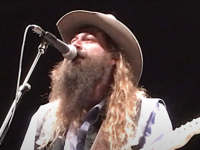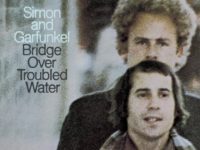Andrea Ward is a New York City-based multi-instrumentalist, dancer, choreographer and filmmaker who has been described as an untethered mystic occupying a realm all her own. This may sound a far-fetched description, but she creates a unique atmosphere.
“My music sounds the way that my dance looks,” Ward says, “both fluid and sharp as if a force of nature was trying to nurture and sting you at the same time, just enough to force you to move.” She relates to percussive instruments and works closely with a drummer to create fine detail, and then builds dance works to it for her music videos.
Ward’s new album Ribbon of Water is ethereal, label-defying and engaging. It is great to hear a musician who appears oblivious to trends and fashions in music as she creates her unique soundscapes. Blending influences from Norwegian rock, Icelandic pop, experimental, and avant-garde means Andrea Ward creates music that falls outside perceived parameters or limitations. Her aim is to allow people to delve deep within themselves and let go of controlling aspects of their lives through music and movement.
“The album is influenced by water, and water is the ultimate guide for letting go, for yielding to forces beyond our control,” Ward says. “I developed injuries this year and came to a point where my body broke down from anything, and my voice as well. Unable to do a lot of things and unable to speak, I was forced to relinquish control of life, and just flow.
“And each experience leaves a mark on us, mentally, and physically, and I can look at a person and see the way that life has beaten them up, and shaped them,” she adds. “It’s made me proud of my brokenness in a way. It makes life’s endeavors more meaningful when we’re dealing with limitations. When I think of life as something that’s slowly devouring me, slipping me away, it makes me want to give myself to life all the more.”
Andrea Ward treats music, movement and the way they communicate as sacred arts, designed to allow liberty of the soul. Life often imitates art, and this was the case in her life. In December, the house where she recorded the album burned down, the same week that she’d decided to let go of some massive ideas about life.
“I had just done a meditation that night of painfully saying goodbye to ideas and projects I had once held closely to my life plan. It was Dave Pelletier’s house, basically a majestic art sanctuary in the woods he had built 20 years ago,” Ward says. “Jump ahead 20 years and I met Dave by such interesting means. I was traveling through Europe and needed a place to settle to record. I intended to stay for a few months, I ended up staying a year. We were connected in deep ways. I created absolutely everything there, the music videos, the underwater footage – I threw Dave’s drum set in the pool for some cool underwater shots.
“I healed my spine there; I healed my grief,” she adds. “Dave is like no other human being. His channels are all open, plants grow faster around him, technology goes haywire. That house, and the fact that it’s no longer there, makes the memory of my time there even more of an enigma. The way that art projects assembled quickly in that house was as if the Earth’s energy was stronger there, or maybe the house had escaped the modern conventional world.
Ward says she feels that “Dave saved my life. He saved my life and I burned his house down! Just kidding, we don’t know how the fire happened, but Dave was really strong through it all, losing such special works of art, incredible paintings, and sculptures. The designer of the house [Steven Henry Lee] claimed it was his big ‘Magnum Opus.’ For me, the fire was like a wild animal, like nature throwing its divine fit. It’s not like the anger that throws dishes across the room. It’s simply a shove out the door, and a wordless thank you for the time spent.”
The music on Ribbon of Water is delicate, yet woven through with a strength that comes from the experiences Ward clearly taps into with her delivery. In “Game,” she sings of being in a rabbit hole of life, of loving the world, not wanting to push, yet being aware of the games played around emotions. The rhythms take on their own life in the second half, introducing the unexpected – and when Ward’s surreal voice enters again, it binds the sound together, like a healing wind.
“Awake at Night” is an eclectic mix of percussive sounds which rise to dominate, tempered by sensuous vocals that perfectly sum up the night-time visions and wakefulness that can happen and the close parity between dreams and life. “Algorithm” is an off-beat, powerful, funky vocal and percussion number defying the precept of algorithms in its variation and disparate patterns. Andrea Ward’s voice comes to the fore on this track, perfectly coupled with the percussion, bass, and fluctuating time patterns.
“Everything That Moves” is woven around a Latin-esque rhythm that works its way throughout the number, the vocals topping out this gorgeous number – just be prepared for the middle section change. “Visiting Rooms” is a beautifully worked creation where voice and guitar meld together in harmony and create beautiful, constantly morphing lines with a strength flowing through the piece that works to emphasize the ethereal beauty of the lyrics. The track was inspired by Alzheimer’s, which runs in Ward’s family.
“It’s just about visiting the different rooms of consciousness,” Ward says, “and of life as if we’re all walking each other through experiences that slowly teach us to let go, which is what we’ll have to do completely in the end.”
“Get Down and Swim” is the closing track on Ribbon of Water, and it’s quirky, packed with interest, powerful percussion, intricate rhythms: a journey in stylistic delights. So ends a beautiful and powerful album, and one which deserves multiple listens.
- Joan Torres’s All Is Fused – ‘Embrace Form’ (2024) - July 14, 2024
- Julian Costello – ‘Vertigo’ (2024) - June 29, 2024
- Eric Anders and Mark O’Bitz – ‘Contrapasso’ (2024) - June 21, 2024




